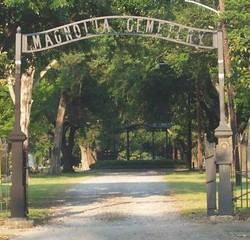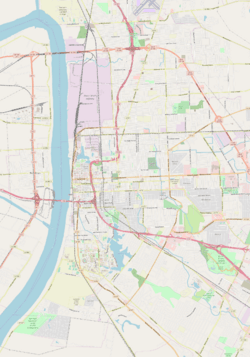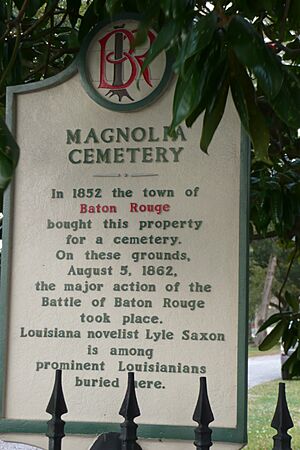Magnolia Cemetery (Baton Rouge, Louisiana) facts for kids
Quick facts for kids |
|
|
Magnolia Cemetery
|
|

Entrance to Magnolia Cemetery
|
|
| Location | 422 North 19th Street Baton Rouge, Louisiana |
|---|---|
| Area | 20 acres (8.1 ha) |
| Built | 1820s |
| NRHP reference No. | 85000161 |
| Added to NRHP | January 31, 1985 |
Magnolia Cemetery is an important and historic cemetery in Baton Rouge, Louisiana. It covers about 10 acres (4 hectares) and has been a burial place for many years.
Contents
About Magnolia Cemetery
This cemetery is located at 422 North 19th Street. It is bordered by Main Street to the north and Florida Boulevard to the south. 19th Street is on its west side, and 22nd Street is on its east side.
The city of Baton Rouge bought the land for the cemetery in August 1852. However, some people were buried here as early as the 1820s.
History of the Cemetery
Magnolia Cemetery was a site of heavy fighting during the Battle of Baton Rouge. This battle happened on August 5, 1862, during the American Civil War. Each August, a special ceremony is held at the cemetery to remember this event.
In 1947, the cemetery was given to the city of Baton Rouge. Today, the Recreation and Park Commission for the Parish of East Baton Rouge (BREC) takes care of it.
National Recognition
Magnolia Cemetery was added to the National Register of Historic Places on January 31, 1985. This means it is recognized as a place important to the history of the United States.
Notable People Buried Here
Magnolia Cemetery was the main burial site for many important people in Baton Rouge. This includes both white and African-American citizens. People have been buried here from the 1820s until today.
Some of the well-known people buried at Magnolia Cemetery include:
- Edward White Robertson (1823-1887): He was a Congressman for Louisiana's 6th District.
- Samuel Matthews Robertson (1852-1911): He was Edward White Robertson's son and also a Congressman.
- John Hill (1824-1910): A notable planter.
- William Brainerd Spencer (1835-1882): He was a Congressman for Louisiana's 5th District.
- Lyle Saxon (1891–1946): A famous novelist.
- Douglas Cullum Montan (1834-1896): He served as a State Senator.
- James M. Elam: A politician from the Whig party.
- James Essex Elam: His son, who served as Mayor of Baton Rouge four times.
- Ellen Bryan Moore: She was a former Register of State Lands.
- Cecil Morgan: He was a state representative. He was known for trying to remove Governor Huey Pierce Long Jr. from office.
See also
 In Spanish: Cementerio Magnolia para niños
In Spanish: Cementerio Magnolia para niños
 | Sharif Bey |
 | Hale Woodruff |
 | Richmond Barthé |
 | Purvis Young |



